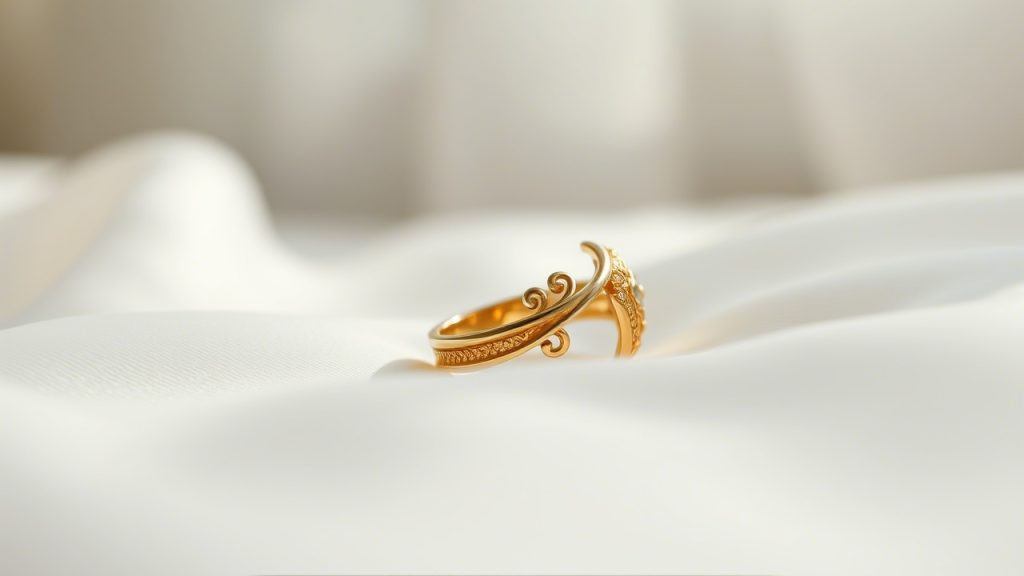How to Choose the Best Ring for Sensitive Skin: A Complete Guide
Rings are often a symbol of love, commitment, or personal style, but for those with sensitive skin, wearing jewelry can sometimes lead to discomfort, irritation, or even allergic reactions. If you have sensitive skin, it’s essential to choose a ring that not only complements your personal style but also ensures your skin remains irritation-free.
We’ll explore the best types of rings for sensitive skin, factors to consider when choosing a ring, materials that are gentler on the skin, and helpful tips for maintaining both your ring and skin health. Whether you’re shopping for an engagement ring, a wedding band, or just a stylish piece of jewelry, knowing how to choose the best ring for sensitive skin will help you enjoy wearing your jewelry without worry.
Why Sensitive Skin Affects Jewelry Wearers
Sensitive skin refers to skin that is prone to reactions such as itching, redness, rashes, and irritation when exposed to certain substances. When it comes to jewelry, the primary cause of discomfort for those with sensitive skin is often the metal or material used to make the ring. Here’s why sensitive skin can react to jewelry:
- Allergies to Metals: Some metals contain alloys (mixtures of metals) that can cause allergic reactions. Common allergic reactions include redness, itchiness, and swelling. Nickel is a notorious metal that causes allergic reactions in many people.
- Moisture Trapping: Certain metals and ring designs can trap moisture or sweat underneath the ring, causing irritation and discomfort over time.
- Chemical Exposure: Exposure to soaps, lotions, perfumes, and other chemicals can irritate sensitive skin, especially when they react with the materials in the jewelry.
Choosing a ring made of hypoallergenic materials and ensuring proper care and maintenance can help avoid these issues.
Key Factors to Consider When Choosing a Ring for Sensitive Skin
1. Material of the Ring
The material your ring is made of plays a significant role in how it interacts with your skin. For individuals with sensitive skin, it’s essential to avoid materials that can cause allergic reactions or irritation. Here are some of the best and worst materials to consider when choosing a ring for sensitive skin:
Best Materials for Sensitive Skin
- Platinum: Platinum is a naturally hypoallergenic metal, making it an excellent choice for sensitive skin. It’s dense, durable, and resistant to tarnish, which makes it ideal for everyday wear. Platinum is also safe for those who may have allergies to other metals like nickel.
- Pure Gold (24k Gold): Pure gold is also hypoallergenic, and it’s a good choice for those with sensitive skin. However, because pure gold is soft, many jewelers alloy it with other metals like copper, which can cause irritation. If you choose gold, opt for high-karat gold, such as 22k or 24k, as they contain fewer alloys.
- Titanium: Titanium is another hypoallergenic material that is lightweight and strong, making it an ideal choice for those with sensitive skin. It’s also resistant to corrosion, so it maintains its appearance over time.
- Sterling Silver (with caution): Sterling silver, made from 92.5% pure silver and 7.5% other metals (usually copper), is a popular option for rings. However, the copper or other alloys can cause allergic reactions in some individuals. Look for sterling silver rings that are specifically labeled as nickel-free if you have sensitive skin.
- Tungsten: Tungsten is a durable and hypoallergenic metal that resists scratching and tarnishing. It’s an excellent option for sensitive skin, although its weight might be a consideration for some.
Materials to Avoid for Sensitive Skin
- Nickel: Nickel is one of the most common causes of metal allergies and skin irritation. It’s often used in costume jewelry or as an alloy in lower-karat gold, silver, or other metals. Avoid rings made from or containing nickel if you have sensitive skin.
- Copper: While copper has a warm, attractive color, it can cause irritation for some people, especially if the copper is exposed to moisture, as it can tarnish and react with sweat.
- Brass: Brass is another material that may contain nickel and can cause allergic reactions in some people. It’s often used in fashion rings or cheaper jewelry, so it’s best to avoid it if you have sensitive skin.
- Stainless Steel (in some cases): While stainless steel is hypoallergenic for many people, some types of stainless steel contain nickel, which can irritate sensitive skin. Opt for surgical-grade stainless steel or titanium if you prefer stainless steel rings.
2. Ring Design and Fit
The design and fit of the ring can also affect how comfortable it is for sensitive skin. Consider the following factors:
- Smooth Inner Surface: Rings with a smooth, polished inner surface are more comfortable for sensitive skin than those with rough or textured interiors. A rough edge can cause irritation or friction when worn for extended periods.
- Comfort Fit: Rings that feature a comfort fit design are rounded on the inside, making them more comfortable to wear, especially for individuals with sensitive skin. These designs reduce pressure on the skin and prevent pinching.
- Avoid Bulkier Designs: While statement rings or large designs may be visually appealing, they can trap moisture and sweat, leading to discomfort. Choose designs that are sleek and less bulky if you have sensitive skin.
3. Finish and Coating
The finish or coating of a ring plays a role in how it interacts with your skin. Some finishes can create a barrier that prevents metals from coming in direct contact with your skin, while others can enhance irritation.
- Rhodium-Plated Rings: Many white gold rings are rhodium-plated to give them a shiny, silver-like appearance. Rhodium plating can help create a barrier between the gold and your skin, preventing irritation. However, rhodium plating can wear off over time, so this is something to keep in mind if you plan to wear the ring frequently.
- Polished vs. Matte Finish: A polished finish is smooth and shiny, making it less likely to trap dirt or moisture, which can irritate sensitive skin. On the other hand, a matte or brushed finish may trap oils and dirt more easily, potentially causing discomfort.
4. Gemstones and Settings
Certain gemstones may also cause skin irritation, particularly if they are set in a way that creates friction with the skin. When choosing a ring with a gemstone, consider the following:
- Hypoallergenic Gemstone Settings: Some gemstone settings may contain alloys that irritate sensitive skin. Choose rings with prong or bezel settings made from hypoallergenic materials like platinum or titanium to minimize skin contact with potentially irritating metals.
- Avoiding Stones with Metal Contact: Some gemstones, like pearls or opals, are softer and more susceptible to damage. Opt for a setting that protects the gemstone and prevents it from making direct contact with your skin.
Read More: Best Rings for People with Active Lifestyles
How to Maintain Your Ring for Sensitive Skin
Proper care and maintenance are essential to keep your ring comfortable and free from irritation. Here are some tips to ensure that your ring stays in good condition:
- Clean Regularly: Clean your ring regularly to remove dirt, oils, and residue that may accumulate over time. Use mild soap and warm water to clean your ring, and dry it thoroughly with a soft cloth.
- Avoid Harsh Chemicals: When cleaning your skin or applying lotions, perfumes, or other products, remove your ring to prevent exposure to harsh chemicals. Certain chemicals can cause irritation or discoloration of your ring over time.
- Keep Your Ring Dry: Moisture can trap bacteria and lead to irritation, so try to avoid wearing your ring while swimming, showering, or performing activities that cause excessive sweating.
- Store Properly: When you’re not wearing your ring, store it in a soft cloth pouch or jewelry box to protect it from scratches and damage.
Frequently Asked Questions
1. What is the most hypoallergenic metal for rings?
The most hypoallergenic metals for rings are platinum, pure gold (24k), and titanium. These metals are unlikely to cause allergic reactions and are ideal for sensitive skin.
2. Can nickel cause allergic reactions with rings?
Yes, nickel is a common allergen and can cause skin irritation, redness, and rashes. Avoid rings that contain nickel if you have sensitive skin or a known nickel allergy.
3. Is sterling silver safe for sensitive skin?
Sterling silver is generally safe for sensitive skin, but it may contain copper or other alloys that could cause irritation. Look for sterling silver rings that are labeled as nickel-free for the best results.
4. How can I tell if a ring will cause irritation?
If you have sensitive skin, it’s essential to choose rings made from hypoallergenic metals like platinum, titanium, or pure gold. Additionally, avoid rings with rough edges or textured finishes that may cause friction or irritation.
5. Should I avoid wearing rings while exercising or doing physical activities?
Yes, wearing rings while exercising or engaging in physical activities can trap sweat, moisture, and bacteria, leading to skin irritation. It’s best to remove your ring during these activities to prevent discomfort.
6. Can I wear a ring with a gemstone if I have sensitive skin?
Yes, you can wear a ring with a gemstone, but be sure the setting is made from hypoallergenic materials like platinum or titanium. Some gemstones may also cause irritation if they are exposed to moisture or chemicals, so take care to clean and store your rings properly.
7. How often should I clean my ring if I have sensitive skin?
It’s a good idea to clean your ring every few weeks to remove oils, dirt, and sweat that may cause irritation. If you wear your ring daily, consider cleaning it more frequently.
8. Can a ring with a rhodium plating help with sensitive skin?
Yes, rhodium plating can help prevent irritation because it creates a barrier between your skin and the metal. However, rhodium plating wears off over time, so you may need to replate the ring periodically.
Conclusion
Choosing the right ring for sensitive skin is essential for comfort, health, and the longevity of both your skin and your jewelry. By considering factors such as the metal material, ring design, gemstone settings, and regular maintenance, you can find a ring that suits your style without causing irritation. Always opt for hypoallergenic materials like platinum, titanium, or pure gold, and take steps to care for your rings to ensure they remain as comfortable as they are beautiful.
Whether you’re buying an engagement ring, wedding band, or fashion accessory, knowing how to select the best ring for sensitive skin will allow you to enjoy wearing your jewelry without worry.
This Tool





